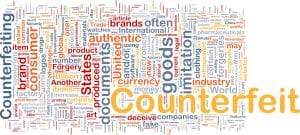Counterfeit goods have been around for a very long time. Not only is consumer demand increasing for less expensive “knock-off” or “replica” products, but availability of these “fakes” is growing as well – especially in the digital age. While paying less for goods that appear to be genuine well-known brands seems harmless, there are in fact serious implications to the prevalence of the counterfeit market.
The growth of counterfeit products is fueled by consumer demand in many industries. However, in other industries such as the compressor lubricant market, widespread counterfeiting is primarily the result of greedy schemes to capitalize on expensive products packaged and sold in small quantities. Actual end users of these lubricants do not drive demand for these counterfeit lubricants. Yet, they fall victim to purchasing non-genuine products directly because they lack product knowledge and misplace trust in certain sellers.

Lubricants play a vital role in the operation, efficiency and productivity of compressors. These compressors are used in a wide variety of applications for various industrial markets, such as refrigeration and air conditioning. In many cases, the lubricant required for a particular application must meet specific criteria for the compressor system and operating environment – in order to function properly and provide its intended features and benefits. Counterfeit products often utilize inferior materials, components and assembly processes in order to produce at a mass scale at the lowest possible cost. Assuming a lubricant is genuine when it is not can have severely damaging effects.
Not only do counterfeit lubricants have potentially damaging effects on machinery, but they can affect so much more. Reputation, revenue generation, productivity – among other things – are affected. The entire value chain in the lubricant industry experiences the damages done by counterfeiting.
Costly Compressor System Issues for End Users
Discovering that counterfeit lubricants have been purchased or worse – used to fill a compressor – can be frustrating to end users. A wide number of compressor problems could occur, including system failure, due to inferior quality and unstable chemistry. The cost of repair/maintenance and subsequent manufacturing down-time can add up quickly.
Companies must pay employees or external service technicians to evaluate the damage and make the necessary repairs. If no backup compressor is available, the company faces lost production time and lost revenue for that particular process. Worse yet, if the compressor unit is under manufacturer’s warranty the end user may risk breaching that agreement and voiding the warranty. Efforts to defend their actions against legal warranty claims can add up quickly for end users and cause serious financial issues.
Lubricant Distribution Networks Suffer
The distributor (or wholesaler in many instances) suffers in multiple ways. Purchases of counterfeit products from other sellers often cause mistrust in distributors altogether. The old phrase, “one bad apple can ruin the barrel” is true in sales as well. Trust in a seller is difficult to maintain and even more difficult to win back once lost. Professional reputations can be marred if not completely ruined forever.


Besides potential damage to a distributor’s brand lines, there are other serious negative consequences they face. Legal battles over warranty issues and origination of fault can consume massive amounts of time and financial resources. These situations can be severely damaging to small and medium-sized distributors who lack the means to defend against such claims.
Manufacturers See Damage to Their Brands
Counterfeiting definitely harms the manufacturers of genuine products and does so in several ways. When end users purchase non-genuine products, they may become frustrated and begin to mistrust the brand. This mistrust makes its way back up the value chain to distributors and manifests itself in decreased demand and lost sales volume/revenue. The trend continues all the way to the original manufacturer with many of the same detrimental effects.
When distributors feel the pinch of decreased demand for certain brands, they may lower forecasts for these products they purchase from the manufacturer. If this happens on a wide enough scale, the manufacturer also sees decreased sales volume/revenue and may experience issues with inventory control. If a solution to the counterfeit issues are not developed, the problems can persist or potentially spread even further.
Brand reputation and image can be powerful tools to help sell products to market(s) through diverse channel strategy efforts. Damage to that brand can have long-lasting effects that either cause temporary demand/revenue lulls, or aid in prematurely declining the brand when dilution from counterfeits reaches critical mass. The power of a brand comes via its unique ability to solve a particular issue better than the next alternative at an equitable value. Once the brand identity is in doubt, the power subsides, and value is lost.
Protecting Brands and Ensuring Genuine Purchases
Counterfeiting has been around for thousands of years and will continue to evolve. Advancements in technology and the digital age have created more opportunities for counterfeiters to bring replica products to market more easily. Protection of branded products and services starts with strategies developed by manufacturers and extends throughout the value chain through education and continuous assessment.


CPI Fluid Engineering has been deploying a brand assurance program for most of the packaging options of the Emkarate® RL series of refrigeration lubricants. Unique label technology that can be used to verify products as genuine is used throughout the Emkarate® line. CPI also utilizes authorized distributors to help not only sell, but also educate end users on the use of genuine products in their compressor systems. To learn more about the brand assurance system click here > Emkarate® RL Anti-Counterfeit. CPI is dedicated to continuing education and re-evaluating the proper means to protect our brands and deliver on the performance expected from our products.
